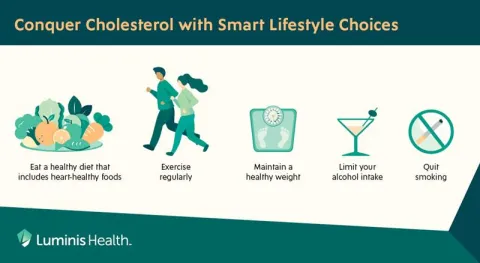
The foods you choose to fuel your body with today, affect your heart health tomorrow. You can do your part to keep your heart healthy by eating a healthy diet. Need some motivation? Studies show up to 70 percent of heart disease cases can be prevented with the right food choices.
You have the power to help prevent heart disease by changing what you eat. And the good news is you don’t have to give up all the foods you love. Focus on making smart, healthy choices at home, work, restaurants and the grocery store. Try this heart-healthy recipe that’s perfect for cold winter months.
Vegetarian Black Bean Soup
Ingredients:
- 1 tablespoon olive oil
- 1 onion, sweet/yellow, diced
- ½ cup carrots, chopped
- ½ cup celery, chopped
- 2 cloves of garlic, minced
- 1 tablespoon chili powder
- 1 tablespoon cumin
- ½ teaspoon salt
- ½ teaspoon black pepper
- 3 cans black beans, drained but not rinsed
- 3 cups vegetable broth, low sodium
- Juice from one lime
- Optional for garnish: ½ cup chopped cilantro, ½ avocado, ½ cup diced green onion/scallions
Directions:
- In a heavy-bottomed pot, heat the olive oil and add onion and garlic, stirring until translucent. Stir in carrots and celery. Cook for five to 10 minutes. Add chili powder, cumin, salt and pepper. Stir and cook for one minute. Add black beans and vegetable broth. Bring soup to a boil. Reduce heat, add lime juice and simmer uncovered for 25 minutes.
- For a thicker-textured soup, use an immersion blender or blender to puree two cups of the soup and add it back into the pot.
- Serve with desired toppings.
Follow these tips to get on the path to a healthier heart:
- Even if a packaged food item looks healthy, it’s best to read the label. Ingredients and nutrient content can vary.
- When choosing between items, compare nutrition information on package labels. Select foods with the lowest amounts of sodium, added sugars, saturated and trans fat. Avoid foods with partially hydrogenated oils.
- Look for the American Heart Association’s Heart-Check mark in the grocery store to identify foods that can be part of a healthy diet. Learn more at HeartCheck.org.
- Watch your calorie intake. To maintain your current weight, consume only as many calories as you use up through physical activity. If you need to lose weight, consume fewer calories and burn more.
- Eat reasonable portions. Most restaurants serve you more food than you should eat. It’s easy to snack on foods like dips and finger-food snacks without knowing how much you actually ate. It’s best to limit these foods to avoid gaining weight.
- Cook healthy meals at home. This way you have more control over ingredients and portion sizes. It may help you save money by not eating out, too.
- Eat a wide variety of foods to get all the nutrients your body needs. Fruits and vegetables are a healthy choice and full of essential nutrients to keep your heart, and your body, healthy.
- Make it fun. Get creative and find snacks that feature vegetables and fruits for special occasions, like the Super Bowl.

By Ann Caldwell and Maureen Shackelford, nutritionists and registered dietitians at Anne Arundel Medical Center. To reach them call 443-481-5555.



